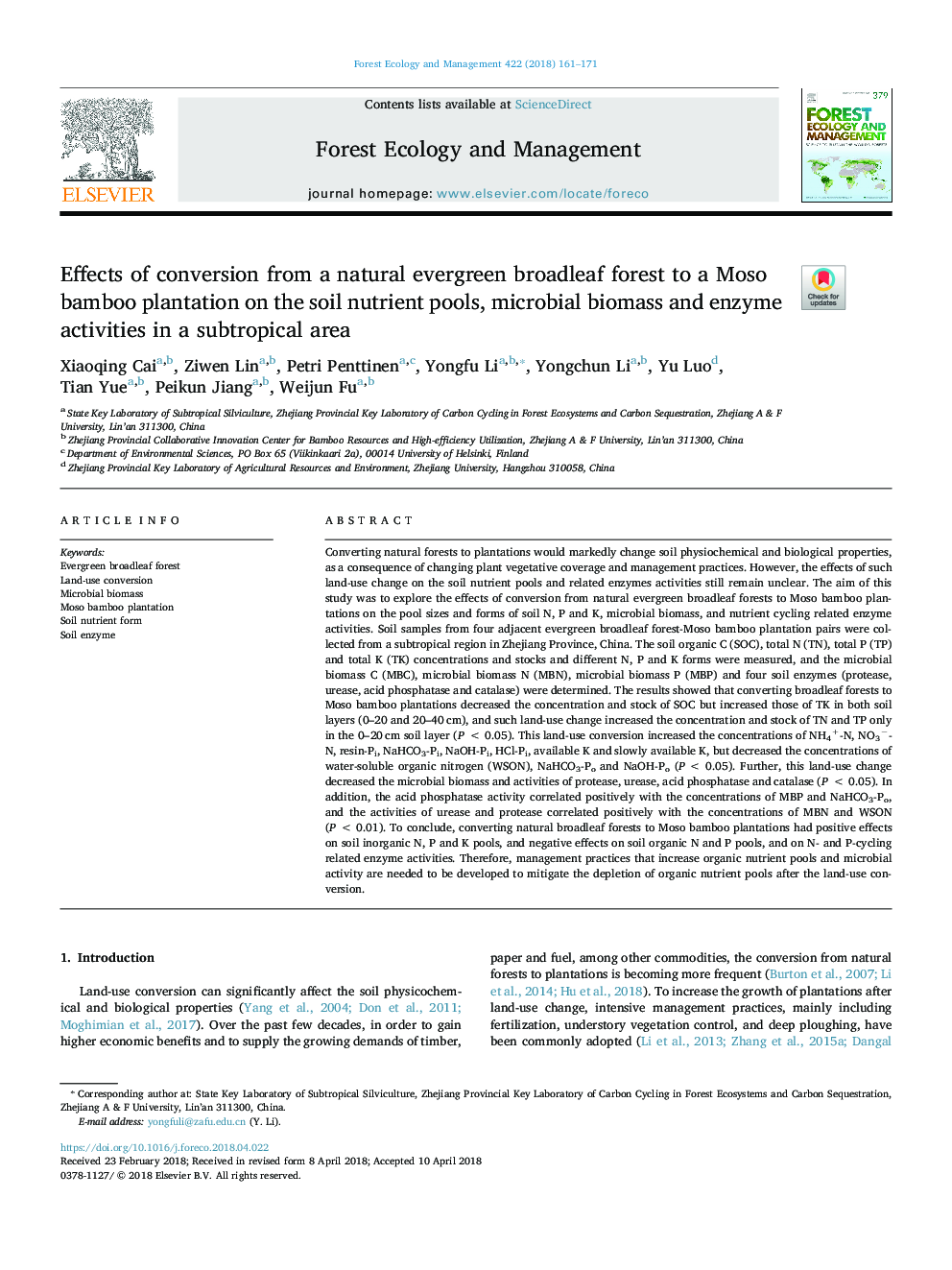| کد مقاله | کد نشریه | سال انتشار | مقاله انگلیسی | نسخه تمام متن |
|---|---|---|---|---|
| 6541661 | 1421338 | 2018 | 11 صفحه PDF | دانلود رایگان |
عنوان انگلیسی مقاله ISI
Effects of conversion from a natural evergreen broadleaf forest to a Moso bamboo plantation on the soil nutrient pools, microbial biomass and enzyme activities in a subtropical area
ترجمه فارسی عنوان
اثرات تبدیل از یک جنگل طبیعی جنگل همیشه سبز به یک بوته مصنوعی بامبو بر روی بوته های مواد مغذی خاک، زیست توده های میکروبی و فعالیت های آنزیمی در منطقه نیمه گرمسیری
دانلود مقاله + سفارش ترجمه
دانلود مقاله ISI انگلیسی
رایگان برای ایرانیان
کلمات کلیدی
موضوعات مرتبط
علوم زیستی و بیوفناوری
علوم کشاورزی و بیولوژیک
بوم شناسی، تکامل، رفتار و سامانه شناسی
چکیده انگلیسی
Converting natural forests to plantations would markedly change soil physiochemical and biological properties, as a consequence of changing plant vegetative coverage and management practices. However, the effects of such land-use change on the soil nutrient pools and related enzymes activities still remain unclear. The aim of this study was to explore the effects of conversion from natural evergreen broadleaf forests to Moso bamboo plantations on the pool sizes and forms of soil N, P and K, microbial biomass, and nutrient cycling related enzyme activities. Soil samples from four adjacent evergreen broadleaf forest-Moso bamboo plantation pairs were collected from a subtropical region in Zhejiang Province, China. The soil organic C (SOC), total N (TN), total P (TP) and total K (TK) concentrations and stocks and different N, P and K forms were measured, and the microbial biomass C (MBC), microbial biomass N (MBN), microbial biomass P (MBP) and four soil enzymes (protease, urease, acid phosphatase and catalase) were determined. The results showed that converting broadleaf forests to Moso bamboo plantations decreased the concentration and stock of SOC but increased those of TK in both soil layers (0-20 and 20-40â¯cm), and such land-use change increased the concentration and stock of TN and TP only in the 0-20â¯cm soil layer (Pâ¯<â¯0.05). This land-use conversion increased the concentrations of NH4+-N, NO3â-N, resin-Pi, NaHCO3-Pi, NaOH-Pi, HCl-Pi, available K and slowly available K, but decreased the concentrations of water-soluble organic nitrogen (WSON), NaHCO3-Po and NaOH-Po (Pâ¯<â¯0.05). Further, this land-use change decreased the microbial biomass and activities of protease, urease, acid phosphatase and catalase (Pâ¯<â¯0.05). In addition, the acid phosphatase activity correlated positively with the concentrations of MBP and NaHCO3-Po, and the activities of urease and protease correlated positively with the concentrations of MBN and WSON (Pâ¯<â¯0.01). To conclude, converting natural broadleaf forests to Moso bamboo plantations had positive effects on soil inorganic N, P and K pools, and negative effects on soil organic N and P pools, and on N- and P-cycling related enzyme activities. Therefore, management practices that increase organic nutrient pools and microbial activity are needed to be developed to mitigate the depletion of organic nutrient pools after the land-use conversion.
ناشر
Database: Elsevier - ScienceDirect (ساینس دایرکت)
Journal: Forest Ecology and Management - Volume 422, 15 August 2018, Pages 161-171
Journal: Forest Ecology and Management - Volume 422, 15 August 2018, Pages 161-171
نویسندگان
Xiaoqing Cai, Ziwen Lin, Petri Penttinen, Yongfu Li, Yongchun Li, Yu Luo, Tian Yue, Peikun Jiang, Weijun Fu,
